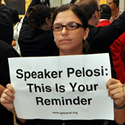National
Push for LGBT bills continues during recess
Activities planned in local districts while Congress takes break

Advocacy groups are planning to take advantage of this month’s congressional recess by stepping up efforts with district offices to build support for pro-LGBT initiatives while lawmakers are at home.
One joint effort between the Human Rights Campaign and Servicemembers Legal Defense Network, for example, is geared toward influencing senators to support repealing “Don’t Ask, Don’t Tell” when the issue comes before the Senate, possibly in September.
As part of this same effort, HRC is also working on building support for bringing the Employment Non-Discrimination Act to a House vote.
Meanwhile, grassroots LGBT group GetEqual is considering ways to expand its direct action work outside the Capital Beltway to reach lawmakers in their home districts.
HRC and SLDN last week announced their effort, called Countdown 2010, which aims to mobilize new grassroots efforts to build support in part toward ending “Don’t Ask, Don’t Tell” in the Senate.
Marty Rouse, HRC’s national field director, said the effort consists of engagement from the organization’s field team as well as encouraging HRC members to reach out to key lawmakers.
“We can’t just talk to our legislators and members of Congress inside the Beltway,” Rouse said. “We have to talk to them in the district so that they see that there’s interest and concern back home.”
Aubrey Sarvis, SLDN’s executive director, said the effort will last until lawmakers return from their August recess and vote on the fiscal year 2011 defense authorization bill, the legislative vehicle to which the Senate Armed Services Committee in May attached a provision that would lead to “Don’t Ask, Don’t Tell” repeal.
“We’ll be down in the targeted states with veterans, former clients of SLDN, friends and family of veterans — hopefully to visit with senators and their key staffers to urge senators to support, one, the [Defense Department] bill and, secondly, to support the provisions in the bill as it came out of the Senate Armed Services Committee,” Sarvis said.
The “Don’t Ask, Don’t Tell” portion of the Countdown 2010 effort is focused on influencing senators in 10 states — Arkansas, Indiana, Montana, Nebraska, Nevada, New Hampshire, North Dakota, Ohio, South Dakota and Virginia — where HRC and SLDN feel they don’t have a firm commitment from senators on the issue.
Rouse said the senators in the states on which HRC is focusing its efforts are Blanche Lincoln (D-Ark.), Mark Pryor (D-Ark.), Richard Lugar (R-Ind.), Jon Tester (D-Mont.), Max Baucus (D-Mont.), Mike Johanns (R-Neb.), John Ensign (R-Nev.), Judd Gregg (R-N.H.), Byron Dorgan (D-N.D.), Kent Conrad (D-N.D.), George Voinovich (R-Ohio), Tim Johnson (D-S.D.) and Mark Warner (D-Va.).
Although Rouse said HRC’s field team is engaged in nearly all of these states throughout the country as part of this effort, he added efforts aren’t yet underway in Montana because of priority and efficiency reasons.
“Montana is a big state, and it’s hard to cover and hard to get to,” Rouse said. “There’s no one in Montana right now, but there will be.”
One of the senators on the list has already publicly indicated his position on “Don’t Ask, Don’t Tell” in the defense authorization bill. Last month, Lugar told the Blade he wouldn’t support removing the “Don’t Ask, Don’t Tell” language from legislation and is unlikely to support a filibuster of the main bill.
Sarvis said SLDN feels Indiana should nonetheless be among the states on which efforts are focused.
“With Sen. Lugar, the commitment is not as firm and unequivocal as we would like, so we hope to engage him back home,” Sarvis said. “But, yes, we are somewhat encouraged by what Sen. Lugar has said to date. But, again, it’s not done until all the votes are cast.”
Also as part of Countdown 2010, HRC is working to influence senators in the targeted states on ENDA while engaging House members in North Carolina, Pennsylvania and Texas to build support for the bill. Rouse said urging senators to support ENDA in these three additional states is less of a priority.
“We really focused on the House and we need to do significant [work] in House districts throughout the country before we even can think of the Senate,” Rouse said. “Our focus right now in the field is making sure that we target these House members. That’s most important.”
Paul Guequierre, an HRC spokesperson, said the efforts in North Carolina, Pennsylvania and Texas are geared toward influencing House Democratic members in these states that aren’t ENDA co-sponsors.
Five of eight House Democrats from North Carolina, five of 12 House Democrats from Pennsylvania and five of 12 House Democrats from Texas aren’t co-sponsors, Guequierre said.
Sarvis said the shared work between HRC and SLDN in this effort would complement the strength of each organization. He noted that HRC has more field organizers and thus would provide more field workers to the effort while SLDN would bring more service members and veterans.
“Whether it’s working with field organizers in place or SLDN veterans, clients, it’ll be a matter of sharing resources and bringing that [all] together over the next six to eight weeks in the most efficient way possible,” Sarvis said.
Rouse said HRC would look at local media to determine whether efforts in these states are making progress and noted that efforts in many states have already produced results.
“We’ve already seen letters to the editor printed, op-eds printed and meetings with the Senate staff have already taken place,” he said. “None of this would have happened were it not for HRC’s staff being on the ground, mobilizing and reaching out to people.”
But for SLDN, evaluating the progress of Countdown 2010 would depend on the results of the meetings with senators and their staffers in these states.
“But the bottom line is you won’t know until the votes have been cast,” Sarvis said. “In some cases, we may get affirmative answers over the next several weeks, but I suspect that in many cases, we won’t get a definitive answer until the senators’ votes.”
GetEqual plans district actions
Meanwhile, GetEqual is planning efforts to draw more attention to ENDA as lawmakers return from break. The efforts are intended to build off previous protests last month in Las Vegas and at the U.S. Capitol.
Robin McGehee, co-founder of GetEqual, said her group has been talking with local organizers about working collaboratively on direct action throughout the country on ENDA and “Don’t Ask, Don’t Tell.”
“We’re trying to work to set up some in-district actions,” she said. “At this moment, we don’t have any targets that we’ll release only because we’re trying to figure out where is the weakest link and what we feel like is going to be strategically the best one to plan most of our attention.”
McGehee said GetEqual will be sending out instructions on ways people can engage in the political process as lawmakers work in their home district.
“It may be some people planning actions; it may be just giving them avenues of engagement that can just get them to engage their legislator around ‘Don’t Ask, Don’t Tell’ or ENDA,” she said.
McGehee said GetEqual is looking at lawmakers’ speaking engagements, town halls, fundraisers and office times as possible opportunities for action.
Wherever the actions take place, McGehee said GetEqual is in part learning from the tactics that conservative protesters used in interrupting town hall meetings last year over health care reform.
“Obviously, you don’t want to be compared to someone who has a conservative platform,” she said. “But, in my opinion, one of the things that we did learn from watching that was the squeaky wheel was getting the grease.”
In the past month, GetEqual asked supporters which of four lawmakers should be targeted for direct action over ENDA: U.S. House Speaker Nancy Pelosi (D-Calif.), Senate Majority Leader Harry Reid (D-Nev.), Rep. Barney Frank (D-Mass.) or Rep. George Miller (D-Calif.).
According to GetEqual, Pelosi won 46.5 percent of the vote, Reid won 18.5 percent, Miller took 17.6 percent and Frank took 17.4 percent. The organization declined to make public the total number of votes.
McGehee said the first and second place rankings of Pelosi and Reid were behind a protest last month in Las Vegas, which was directed against Reid, and another protest in the U.S. Capitol, which targeted Pelosi.
But whether GetEqual continues to target Pelosi and Reid during their August break remains to be seen.
“I don’t know for sure that we’ll go back to those targets,” McGehee said. “Honestly, for us, it’s just looking at where you have local organizers that also want to be involved, and finding out from the advocacy groups that really have the inside strategy where do they feel like the hold up is actually happening.”
New York
N.Y. lawmaker vows ‘Pride flag will fly again’ at Stonewall Monument
After a Jan. 21 policy shift, Pride flags were banned at national parks, prompting backlash from Bottcher and LGBTQ advocates.

Hours after news broke that the National Park Service would no longer allow Pride flags to fly at the Stonewall National Monument — the birthplace of the modern LGBTQ rights movement in the United States — the Washington Blade spoke with New York State Sen. Erik Bottcher, who represents the area surrounding the Stonewall Inn and the national monument.
During the interview, Bottcher, who is gay, spoke about the policy change and outlined steps he plans to take in the coming days to push for its reversal.
“This is another act of erasure,” Bottcher told the Blade. “It’s a cowardly attempt to rewrite history and to intimidate our community. This is Stonewall — it’s where we fought back, where we ignited a global movement for equality — and we refuse to go back. We’re not going to accept these acts of erasure.”
The Stonewall Inn became a flashpoint in 1969 after NYPD officers raided the bar, part of a longstanding pattern of police harassment of LGBTQ spaces. The raid sparked days of protest and resistance along Christopher Street, now widely recognized as the catalyst for the modern LGBTQ rights movement.
While the events are often referred to as the “Stonewall Riots,” many activists and historians prefer the term “Stonewall Uprising,” emphasizing that the resistance was a response to systemic oppression rather than senseless violence. LGBTQ patrons and community members fought back — shouting “Gay Power!” and “Liberate Christopher Street!” — as crowds grew and frustration with police abuse boiled over.
Since the uprising, LGBTQ people and allies have gathered annually in June to commemorate Stonewall and to celebrate Pride, honoring the movement that placed LGBTQ voices at the center of the fight for equality.
In June 2016, then President Barack Obama officially designated the space as the Stonewall National Monument, making it the United States’s first national monument designated for an LGBTQ historic site.
Now, nearly 10 years later, President Trump’s appointed NPS acting director Jessica Bowron changed policy on Jan. 21 regarding which flags are allowed to be flown in national parks. Many, including Bottcher, say this is part of a larger targeted and deliberate attempt by the administration to erase LGBTQ history.
“It’s clear they’re making a conscious decision to erase the symbols of our community from a monument to our community’s struggle,” he said. “This is a calculated and premeditated decision, and it could be — and should be — reversed.”
“Let’s be clear,” Bottcher added, “they wish we didn’t exist … But we’re not going anywhere. We refuse to go back into the shadows.”
When asked why it is critical to challenge the policy, Bottcher emphasized the importance of visibility in preserving LGBTQ history.
“This is why it’s so important that we not let this stand,” he said. “Visibility is critical. When people see us, learn about us, and get to know us, that’s how we break down prejudice and stereotypes. We cannot allow them to push us back into the shadows.”
Other LGBTQ leaders and elected officials were quick to condemn the removal of the Pride flag, which had flown since the site’s official designation as a national monument.
New York City Mayor Zohran Mamdani called the decision “outrageous.”
“I am outraged by the removal of the Rainbow Pride Flag from Stonewall National Monument,” Mamdani said in a statement. “New York is the birthplace of the modern LGBTQ+ rights movement, and no act of erasure will ever change or silence that history.”
“Our city has a duty not just to honor this legacy, but to live up to it,” he added. “I will always fight for a New York City that invests in our LGBTQ+ community, defends their dignity, and protects every one of our neighbors — without exception.”
Senate Minority Leader Chuck Schumer also condemned the move.
“The removal of the Pride Rainbow Flag from the Stonewall National Monument is a deeply outrageous action that must be reversed immediately,” Schumer said in a statement to The Advocate. “Stonewall is a landmark because it is the birthplace of the modern LGBTQ rights movement, and symbols of that legacy belong there by both history and principle.”
Cathy Renna, communications director for the National LGBTQ Task Force, said the flag’s removal will not erase the movement it represents.
“They can take down a flag, but they can’t take down our history,” Renna said. “Stonewall is sacred ground rooted in resistance, liberation, and the legacy of trans and queer trailblazers who changed the course of history.”
Human Rights Campaign National Press Secretary Brandon Wolf echoed that sentiment.
“Bad news for the Trump administration: these colors don’t run,” Wolf said. “The Stonewall Inn and Visitors Center are privately owned, their flags are still flying high, and that community is just as queer today as it was yesterday.”
Tyler Hack, executive director of the Christopher Street Project, said the removal was aimed squarely at LGBTQ visibility.
“The Pride flag was removed from Stonewall for one reason: to further erase queer and trans people from public life,” Hack said. “Stonewall marks the moment when queer and trans people fought back and demanded dignity. Our history is not theirs to erase.”
Bottcher closed with a promise to his constituents — and to the broader LGBTQ community — that the Pride flag’s removal would not be permanent.
“We will not be erased. We will not be silenced,” he said. “And the Pride flag will fly again at the birthplace of our movement.”
Florida
Disney’s Gay Days ‘has not been canceled’ despite political challenges
GayDays is moving forward with its planned LGBTQ meet-up

Gay Days in Orlando is preparing for its 2026 gathering though organizers have yet to release full details.
Concerns emerged about the status of the annual meetup of LGBTQ people at Walt Disney World in Orlando, Fla., after social media posts and multiple news outlets reported the event would not take place this year.
In response to inquiries from the Blade, Josh Duke, co-owner of Gay Days, clarified that an update would come this week.
“At this time, I’d like to clarify that Gay Days Orlando has not been canceled,” an email to the Blade said. “We are currently finalizing details regarding our plans for 2026 and will be making an official announcement later this week.”
Earlier this week, Gay Days posted about a pause in their plans for the annual meeting, which quickly gained traction online.
In an official statement on social media, Gay Days organizers cited several factors behind what had initially appeared to be a cancellation of their 2026 event.
“Changes to our host hotel agreement, the loss of key sponsorship support, and broader challenges currently impacting LGBTQIA+ events nationwide made it impossible to deliver the experience our community deserves,” organizers wrote. However, the statement added, “This is a pause — not an ending.”
In a longer message shared with supporters, organizers elaborated on that now-reversed decision.
“Gay Days Family — it is with very heavy hearts that we share Gay Days 2026 will not take place this year. This was an incredibly difficult decision and one that was only made after every possible option was explored.
“Gay Days has always been more than an event — it is community, family, and a place where so many memories are made. While this pause is painful, it also gives us the opportunity to step back, listen, and begin shaping a stronger and reimagined GayDays for the future. Thank you for your continued love, patience, and support. This is not goodbye — it’s a reset, and we look forward to creating the future of GayDays together.”
GayDays, which began in 1991, encourages queer Disney fans to visit the Orlando theme park while wearing red shirts to identify one another. Originally focused on gay men reclaiming the childhood joy often denied due to homophobia, the event has expanded over the years to include LGBTQ+ families on summer vacations and queer couples honeymooning in the Magic Kingdom.
Disney made history in 2019 by holding its first-ever official Pride event at its European park, Disneyland Paris. In 2023, Disneyland California hosted the first U.S. official Pride event.
Concerns about the potential cancellation had arisen amid broader challenges affecting LGBTQ events nationwide. These include changes in hotel agreements, sponsorship support, and Florida’s increasingly restrictive anti-LGBTQ policies under Gov. Ron DeSantis. Florida currently has an equality score of -3.00 out of 49 from the Movement Advancement Project, which evaluates states based on policies affecting relationship and parental recognition, nondiscrimination, religious exemptions, LGBTQ youth, healthcare, criminal justice, and transgender identity documentation.
Recent legislation in Florida has included prohibitions on hormone replacement therapy for transgender minors, restrictions on adult access to treatment, bans on drag performances for those under 18, bathroom bans for transgender people in state buildings, and expansion of the Parental Rights in Education Act, commonly called the “Don’t Say Gay” law. These measures limit public school instruction or discussion about sexual orientation and gender identity.
Gay Days Anaheim is scheduled to take place at Disneyland Resort in September.
Disney has also maintained a focus on Pride, reporting in 2022 that proceeds from Pride merchandise benefited numerous LGBTQ organizations, including GLSEN, PFLAG, The Trevor Project, Zebra Coalition, the Los Angeles LGBT Center, the LGBT Center Orange County, the San Francisco LGBT Center, and the Ali Forney Center. Pride merchandise sold internationally supports local LGBTQ organizations in those regions.
More details about this event are expected to be released on Friday.
New York
Pride flag removed from Stonewall Monument as Trump targets LGBTQ landmarks
The new NPS policy targets Pride flags amid consistent efforts from the Trump administration to minimize LGBTQ history.

A rainbow Pride flag flying at the Stonewall National Monument in New York was removed at the direction of Trump administration officials at the National Park Service, according to a source familiar with the matter who spoke to the Blade on condition of anonymity.
The source said the move had been in the works for weeks and is part of ongoing efforts by the Trump-Vance administration to erase LGBTQ identity from federally controlled landmarks.
In response to the Blade’s request for information about the new flag policy, the National Park Service provided the following statement:
“Current Department of the Interior policy provides that the National Park Service may only fly the U.S. flag, Department of the Interior flags, and the Prisoner of War/Missing in Action flag on flagpoles and public display points. The policy allows limited exceptions, permitting non-agency flags when they serve an official purpose. These include historical context or reenactments, current military branch flags, flags of federally recognized tribal nations affiliated with a park, flags at sites co-managed with other federal, state, or municipal partners, flags required for international park designations, and flags displayed under agreements with U.S. Citizenship and Immigration Services for Naturalization ceremonies.”
The statement also included official guidance on the display of non-agency flags issued by Trump-appointed National Park Service Director Jessica Bowron.
The Blade reached out to other organizations to confirm the status of the Pride flag last week, including the Stonewall National Monument Visitor Center, the NYC Landmarks Preservation Commission, and the National Parks Conservation Association. None were able to provide details about whether the flag was still flying at that time but it has since been removed.
This action aligns with other moves targeting and erasing LGBTQ history. In September, the Blade reported that three organizations originally slated to receive more than $1.25 million from the National Park Service’s Underrepresented Communities Grant Program would no longer receive funding: In Washington, D.C., the Preservation League had been awarded $75,000 to document LGBTQ+ historic resources. In Providence, R.I., the Preservation Society was slated for $74,692 to conduct an LGBTQ+ survey and prepare a National Register nomination. And in New York, the Fund for the City of New York, Inc., had been awarded $32,000 to nominate the residence of Bayard Rustin — the iconic civil rights and LGBTQ activist — as a National Historic Landmark.




















